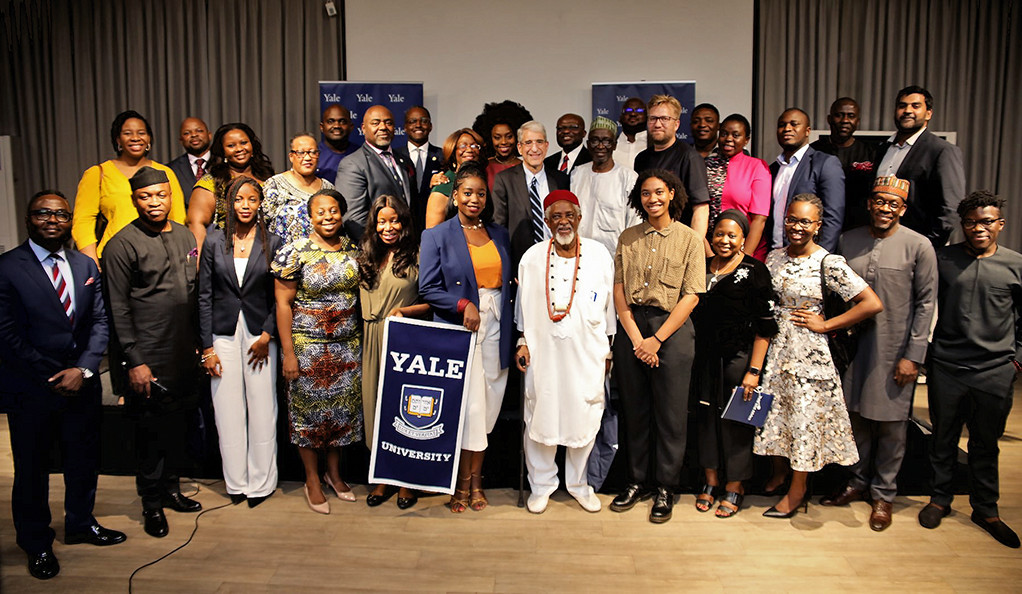
YaleNews
While many Yalies rested or vacationed over winter break, University President Peter Salovey embarked on a four-day trip to Nigeria, addressing Yale’s various partnerships throughout the region.
In an interview with the News, Salovey described three primary reasons for his visit, emphasizing his work with members of the Yale Department of Psychiatry to expand mental health services to remote areas of Nigeria. He also checked in on some of the Yale School of Management’s partner institutions in the region and visited the Nigerian National Museum to discuss methods of preserving cultural artifacts from around the country. All of these fall under the umbrella of the Yale Africa Initiative, a program aimed to expand partnerships between Yale and institutions in Africa.
“The principle behind the Yale Africa Initiative is partnership,” Salovey said. “Partnership where both Yale and a partner in Africa bring something to the table and ideally do something together that neither of us would do ourselves. And the number one thing I did in Nigeria is set up new partnerships and reaffirm existing ones.”
Yale’s psychiatric partnership is called the Health Action for Psychiatric Problems in Nigeria including Epilepsy and Substances — or HAPPINESS — Project. It aims to teach healthcare professionals in Nigeria how to include mental health treatments within their primary care offerings.
Over break, Salovey discussed plans for expanding the project to every primary care facility in Nigeria, especially focusing on Imo State, a remote area in Nigeria where “it is virtually impossible to get a mental health care referral,” according to a Jan. 17 press release. A partnership between the Yale Department of Psychiatry and the Imo State University Teaching Hospital, the HAPPINESS Project is supported by multiple entities, including the Yale Global Mental Health Program and the Imo State government.
Involved in the HAPPINESS Project are Yale psychiatrists Theddeus Iheanacho and Charles Dike, both of whom hail from Imo State. According to the press release, Iheanacho — aided by Dike — launched a program in 2018 to instruct primary care workers on how to confront conditions such as depression or psychosis.
“You can imagine if Connecticut had one psychiatrist and no psychiatric hospital,” Iheanacho said according to the press release, referring to the analogous situation in Imo State. “Most of these people would otherwise not have access to treatment or else would have [to travel] five or six hours to get it. Anything we can do to push the needle, even if we can only get 100 people into care, it’s worth it.”
Salovey also visited the Lagos Business School as part of the Global Network for Advanced Management, speaking to students and the school’s dean in a colloquium. According to GNAM’s website, the network includes 30 institutions and seeks to share management training across leading global universities.
According to Salovey, GNAM allows schools to share opportunities for students and allows MBA students from other institutions to complete programs at Yale SOM.
“It’s a very important network and it has really served to globalize management education at Yale and connect us throughout the world,” Salovey said.
Salovey first announced the formation of the Yale Africa Initiative in 2013 during his inaugural address. According to the Initiative’s website, Africa’s growing economic power and increased migration to and from the continent provides unique opportunities for collaboration and research. As a result, the University created the Initiative to foster new relationships.
According to Vice President and Vice Provost for Global Strategy Pericles Lewis, the Initiative has resulted in increased enrollment of African students at Yale and more faculty hires to develop academic programs. The Initiative’s website also states that since the creation of the project, 79 Africa-based summer internships have been made available to students while African Yale Clubs have been established in Nigeria and Ghana.
Lewis noted that a significant portion of the work within the Initiative involves medical or business education. For example, Lewis visited a medical school in Kampala, Uganda last March and also worked with the Yale Global Health Leadership Institute in Ethiopia.
“I think the attitude has been, let’s take a region and focus on it in order to strengthen it and bring Yale’s level in that area up to the top,” Lewis told the News.
The Yale Africa Initiative also supports the Yale Young African Scholars program, which has introduced 1,391 students from 43 African countries to the liberal arts and taught them about applying to American universities, according to the Initiative’s website.
Valerie Pavilonis | valerie.pavilonis@yale.edu







